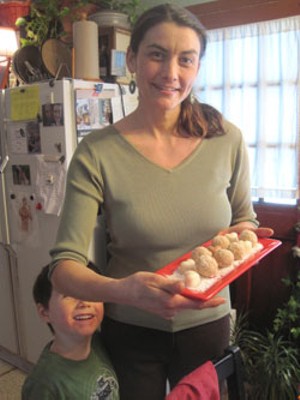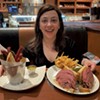Published January 16, 2013 at 10:37 a.m.
Though personal therapeutic chef Tara Carpenter uses the word “diet” to describe her cooking methods, her Barre business, Happy Bellies, is not focused on privation. “We use a lot of fats. Goose fat, duck fat, pork fat. If I see a farmer downtown, I say, ‘Did you just slaughter?’” she says with palpable excitement.
Weight loss can be a pleasant side effect, but it’s not the purpose of Carpenter’s cuisine. Her aim is healing.
Currently a second-year online student in holistic nutrition consulting at Bauman College in Penngrove, Calif., Carpenter, 38, believes that 70 to 80 percent of the immune system is part of the digestive system. While a few of Carpenter’s recommendations may sound radical — one involves consuming the postnatal placenta — the principles undergirding them may not be, according to Carol Gardner, a Colchester osteopath and nutritionist who has not worked with Carpenter. Gardner agrees that digestive balance is key to health. “All holistic doctors feel that it’s not just ‘You are what you eat,’ but also what you absorb and utilize. We think that the GI [gastrointestinal] system is probably your most important immune organ,” she says.
The Happy Bellies method is based on avoiding all potentially sensitivity-inducing foods while bolstering the body with nutrient-dense, probiotic ones. Many of Carpenter’s clients come to her with specific physical complaints or on the instructions of their doctors. But Carpenter claims the diet is good for everyone; most people who follow it for anywhere from a few months to a few years reap potentially lifelong benefits, including eliminating food and environmental allergies.
She might have a point. University of Vermont gastroenterologist and hepatologist Peter Moses says that the College of Medicine and the Department of Animal Sciences “are currently collaborating on projects that analyze the gut microbiota and match bacterial genetic footprints to certain medical conditions.” He adds that prebiotic and probiotic foods are widely recommended for some patients with certain GI disorders.
At Happy Bellies, Carpenter works with patients and their doctors to tailor diets to treat ills ranging from cancer to autism. Her method combines elements of her own hard-won food knowledge with the GAPS (Gut and Psychology Syndrome) diet, the whole-fat teachings of Weston A. Price, and the detoxifying Body Ecology diet.
Though the diet is unlikely to be harmful, not all doctors see much potential benefit. Moses writes in an email, “Yeast is ubiquitous in the environment. Pathogenic yeast (those that can cause human disease) are found on household surfaces, in our noses and mouths, and on our skin. These organisms cause disease in a small number of individuals only when immunity is compromised. It is scientifically unproven, and very unlikely that a yeast-free diet has any effect on human disease.”
But Carpenter has her own anecdotal evidence. The chef’s journey of medicinal eating began at age 21, when lifelong asthma and chronic allergies became too much for her to bear. “I would start the day with chocolate, then coffee, and French fries for lunch. That was how I ran my body,” Carpenter says. “I was taking Triaminic and Sudafed like candy to keep my body dried up.”
Realizing that changing her abysmal diet might improve her health, Carpenter made the dramatic leap to macrobiotics. She ate lean, unprocessed vegetables and grains — until another health event made her rethink the method.
During the pregnancy with her second son, now 5, Carpenter began to develop chronic strep and yeast infections. “Macrobiotics wasn’t helping me at that point. I realized I once again had to tighten up my diet,” she recalls.
She runs to her bookshelf to share the tome that changed her life: The Body Ecology Diet: Recovering Your Health and Rebuilding Your Immunity by Donna Gates and Linda Schatz. Their eating plan entails cutting out gluten, sugar and yeast; Carpenter says that when she was tested two years later, it had eliminated the troublesome yeasts and fungi from her body. She’s now working on a book of her own to help others in similarly dire circumstances.
Already a macrobiotic counselor and healing chef, Carpenter possessed knowledge of Chinese medicine and nutrition that allowed her to think outside the Body Ecology box, combine that plan with other types of low-impact eating and come up with her own methods. In its most basic form, the Happy Bellies diet is based on “properly combining” gluten-, sugar- and yeast-free foods so as not to feed pathogenic yeast, bacteria or parasites.
What is a proper combination? Carpenter sets forth basic rules designed to enhance digestion of each food: Eat fruits alone or on an empty stomach; eat proteins and starchy foods with nonstarchy vegetables. In Chinese terms, these techniques balance the yin and yang of the food.
Those regulations don’t stop Carpenter from setting out a feast for a recent lunch at her home. The meal begins with a shot of Purple Potion, the brine left over from a dish of cultured, unsalted cabbage and beets. The chef explains that the bright-purple concoction is best for children and for adults whose bodies may not yet be conditioned to handle the alcohol-like burn of fermented food. The slightly chunky shot of Purple Potion is sour enough to taste almost carbonated, yet just sweet enough to suggest powerful lemonade.
The aperitif gives way to a cup of red clover, spearmint and raspberry-leaf tea. Carpenter explains that the tisane’s warmth helps relax the stomach for the work it’s about to do. “I rarely start a meal without it — just to let the stomach juices wake up and know that food’s about to arrive,” she says.
To continue the warming trend, she serves a cup of spinach soup. The creamy texture of the dark green potage comes not from dairy, which causes sensitivity in some of Carpenter’s patients, but from sunflower seeds. Specifically, “predigested” sunflower seeds. This isn’t as gross as it sounds; no one chewed up the seeds, mother-bird style. They were simply soaked in salt water to remove hard-to-digest phytic acid.
The rest of the meal is a global mashup of whole-fat, high-nutrient foods. Though many of Carpenter’s patients are sensitive to eggs, she says the problems are usually just caused by proteins in the albumen. Yolks rarely cause the same damage to the “gut lining,” the chef says. Hence her frittatas, a popular choice with patients and at catering gigs, which combine creamy egg yolks with matchsticks of zucchini, seasoned with dill and parsley.
Along with a pair of fermented salads Carpenter offers a more conventional one featuring radicchio, shiitakes and artichokes. Though “conventional” may not be the right word. One bite reveals the addition of bacon fat, which gives the bowl of greens a luscious waft of fatty smoke. A glowing green dressing of avocado and lime lends a bright flavor without added oils.
Another vegetable dish, Japanese kinpira gobo, showcases Carpenter’s predilections not only for wild foods but for using every part of pastured animals. She wildcrafted the burdock at her older son’s elementary school. The blood purifier and prebiotic (it feeds good intestinal flora) is stir-fried with carrots in the fat from a goose that Carpenter purchased from a local farmer. Currently, pieces of a whole lamb, including nutrient-rich liver and heart, wait in her chest freezer, the result of the first slaughter of one of her own animals, courtesy of her husband Tomas Vondra.
Vondra, a Czech architect who makes a mean natto (a gooey, cheesy-tasting Japanese fermented-soybean dish), designed the Happy Bellies Center that Carpenter will open in Cabot this spring. The center and its farm full of pastured animals will be adjacent to Rhapsody Farm. There, the Welters family grows its own rice for a fermented drink called amazake, and processes the tempeh it started selling at the now-closed Rhapsody Café in Montpelier in 1997.
Once the Happy Bellies Center opens, Carpenter will invite clients to learn to cook their own food in her commercial kitchen, using the lambs, chickens, goats and rabbits that she and Vondra will slaughter there — as well as Rhapsody tempeh, of course.
Though Carpenter’s job title is “therapeutic personal chef,” she says she prefers to teach clients how to make their own food rather than prepare it for them. “Having a personal therapeutic chef isn’t for everybody,” she says. “My motto is to teach people to fish for themselves. Cooking is wonderful, but I want to teach.”
Customized menu plans are among Happy Bellies’ most popular services. Still, “hitting the bull’s-eye” every day, as Carpenter puts it, can be a challenge. Not everyone has time to make their own stocks and ferment their own veggies. Other clients are too ill to cook for themselves.
A full-time student and mom, Carpenter finds time to maintain two or three personal chef clients at a time. These have sometimes included patients in hospice care, whom Carpenter seeks to comfort by balancing their yin and yang with warming or cooling foods.
On the other end of the spectrum, Carpenter particularly enjoys working with postnatal mothers. She is one of New England’s few certified “placenta encapsulation” specialists, meaning that she dehydrates the uterine sacs for new mothers to consume in capsules, a practice meant to restore hormones and nutrients lost in childbirth. Demand is such that Carpenter drives all over the region several times a month to pick up placentas, which she then steams, dehydrates, grinds and puts into empty capsules for the clients.
The byproduct of the encapsulation process is called mother’s broth, a liquid that Carpenter recommends mothers mix into soups or stews. For women not ready to take the plunge of eating their own organs, she freezes the broth, just in case they decide to try it later. “The placenta oils help tighten things up and bring warmth to the organs, especially to reproductive organs,” Carpenter says. “When they take a mother’s broth, they feel a difference within a hour.”
Nutritionist Gardner, a vegetarian, wouldn’t eat mother’s broth herself but says she can see the benefits of this practice. “It seems like it’s not just an old wives’ tale,” she says. “Placentas are really rich in proteins and irons. Their stem cells are special, powerful, very nutritious cells — really the essence.”
Controversial as some of Carpenter’s claims may be, no one can argue with the flavors of Happy Bellies cuisine, and dishes such as lamb kebabs and Caribbean lime halibut are far from boring health food. And Carpenter isn’t afraid to serve up rich desserts, such as ghee-based truffles she calls Cinnamon Kisses. Leaving clients feeling like they can enjoy food without fear, whether at home or in restaurants, is Carpenter’s way of keeping them healthy for life.
The print version of this article was headlined "Intestinal Fortitude".
More By This Author
About the Artist

Matthew Thorsen
Bio:
Matthew Thorsen was a photographer for Seven Days 1995-2018. Read all about his life and work here.
Matthew Thorsen was a photographer for Seven Days 1995-2018. Read all about his life and work here.
Speaking of Food, health & Fitness
-

Q&A: Howard Fisher Delivers Meals on Wheels With a Side of Good Cheer
Dec 20, 2023 -

Video: Howard Fisher Delivers Meals on Wheels
Dec 14, 2023 -

Q&A: Alexis Dexter Rescued 57 Shelter Cats During the July Flood
Sep 13, 2023 -

Video: Two Months After the Flood, Alexis Dexter Rebuilds Kitty Korner Café in Barre and Continues to Rescue Cats
Sep 7, 2023 -

Video: Saying Goodbye to Burlington’s Penny Cluse Café
Nov 17, 2022 - More »
Comments
Comments are closed.
From 2014-2020, Seven Days allowed readers to comment on all stories posted on our website. While we've appreciated the suggestions and insights, right now Seven Days is prioritizing our core mission — producing high-quality, responsible local journalism — over moderating online debates between readers.
To criticize, correct or praise our reporting, please send us a letter to the editor or send us a tip. We’ll check it out and report the results.
Online comments may return when we have better tech tools for managing them. Thanks for reading.














































